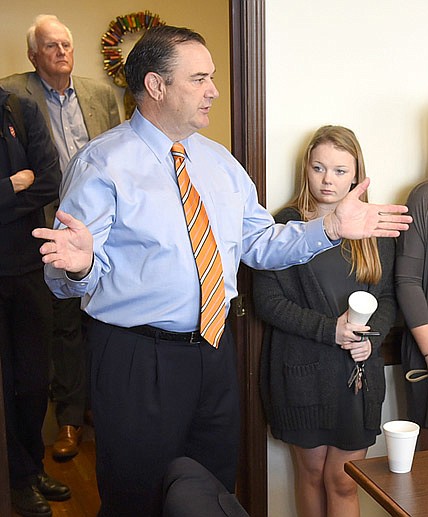State Sen. Mike Kehoe, R-Jefferson City, said it was one of his biggest disappointments for the just-completed legislative session.
"The only reason (this session) wasn't a total home run is because of state employees," he told the News Tribune after the General Assembly ended its 2017 regular session Friday evening. "I would rather have seen some type of process put in place to show state employees our appreciation - and what their career path could be.
"Because I think that's getting to be a real problem - especially as the labor market (improves) and unemployment here in Jefferson City shrinks."
Several different studies have placed state government's employees as the nation's lowest-paid, based on average pay among the 50 state governments.
But Gov. Eric Greitens didn't propose a raise in his budget plan, and lawmakers didn't include one in the $27 billion budget they passed just over a week ago.
State Rep. Travis Fitzwater, R-Holts Summit, just finished his second legislative session and told the News Tribune he has pushed for state employee raises, but in a budget year like this one, things were tight.
"We've all worked diligently toward this issue, setting it as a priority," Fitzwater said. "We were able to pass other pieces of legislation for state employees that enhances the benefits of working for the state."
Those changes affect employees' retirement.
One change replaces a 2010 law that said state employees hired after Jan. 1, 2011, would have to work 10 years before they would be vested in the Missouri State Employees Retirement System, or MOSERS, and eligible to receive benefits.
The Legislature returned the vesting requirement to five years.
State Rep. Jay Barnes, R-Jefferson City, said the bill also would create an incentive for retirees to re-enter the workforce, without having to work another decade to recap the benefits.
The bill sent to Greitens also allows people who are vested in MOSERS, but no longer working for the state, to receive a lump sum payment instead of a deferred annuity - if they ask for that option by May 31, 2018.
State Treasurer Eric Schmitt likes that idea.
"Earlier this year, I called on the Missouri General Assembly to pass an advanced benefits reform package in order to reduce the fiscal burden of our state's troubled pension system," Schmitt said in a news release Friday. "I applaud the Legislature for answering that call (and) taking this important first step toward shrinking the size of our pension problem through smart, fiscally conservative reforms."
MOSERS Director John Watson said last month that idea is a common practice for pension systems.
"The most important thing is it's at the employee's option," Watson said. And it only would affect around 19,000 of the system's 115,000 members.
In its version of the budget, the House proposed the state pay less into MOSERS than the agency's board had requested.
The Senate restored full funding, and the final budget bills kept that full funding.
Kehoe said: "I was happy that we did get the retirement system funded.
"I think that was good - at least they have that piece of mind."
State Rep. Mike Bernskoetter, R-Jefferson City, told the News Tribune he likes the "early buyout" feature lawmakers also approved for state workers who don't want to wait the full length of time required for retirement. For example, with a 60 percent buyout option, a person was set to receive $10,000 at retirement would receive $6,000.
Although it wasn't a legislative action, Fitzwater applauded Greitens' executive order earlier this year, providing paid leave to new parents who work in the executive branch agencies under the governor's control.
Some other state agencies, like the Transportation department, also adopted that plan.
Fitzwater said that plan is attractive to young couples and families who want to work for the state.
But Senate President Pro Tem Ron Richard, R-Joplin, disagreed.
"We pushed back - I still think that was the wrong decision," Richard said.
House Speaker Todd Richardson, R-Poplar Bluff, told reporters Friday evening that Missouri has a strong state employee workforce - and area lawmakers have worked very hard to focus on those efforts.
"So to be able to do some things on the benefit side is helpful and meaningful, as we continue to look for ways to increase their pay," he said.

